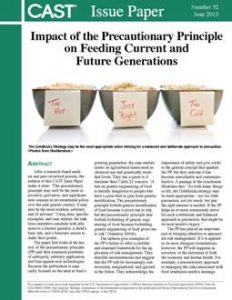Register Now for the “Soil Health and the Hydrologic Cycle” Paper Rollout and 2024 BCCA Announcement
CAST’s new Issue Paper, Impact of the Precautionary Principle on Feeding Current and Future Generations, looks at the history of the precautionary principle (PP) and examines problems of ambiguity, arbitrary application, and bias against new technologies. Because the publication is especially focused on the need to feed a growing population, the case studies center on agricultural issues such as pesticide use, genetically modified foods, and food irradiation.
The authors state that the PP has played an important part in bringing attention to appropriate risk management. If it is applied in its more stringent formulations, however, the PP will suppress innovation, to the detriment of both the economy and human health. In this paper, the authors:
Commonsense safety practices are necessary, and the paper does not advocate reckless abandon. But the findings indicate that, in many respects, the PP does more harm than good. As the authors say, “The future involves a mission to feed a population of 9.1 billion by 2050. The PP has failed as an overall risk management strategy, and it is time to move past it.”
Task Force Authors:
Gary Marchant (Chair), Arizona State University
Linda Abbott, United States Department of Agriculture
Allan Felsot, Washington State University
Robert L. Griffin, United States Department of Agriculture
Related Publications:
Your donation to CAST helps support the CAST mission of communicating science to meet the challenge of producing enough food, fiber and fuel for a growing population. Every gift, no matter the size, is appreciated.